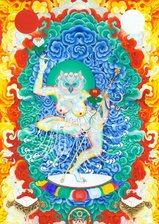Karma Yönten Ling - Föreningen för Tibetansk Buddhism i Malmö - Lund | medlems sidor
Okuvlig Öppenhet – Irrepressible Openness
Exploring the Sutric Buddhist teachings on how to be happy - from the perspective of Dzogchen.
Friday evening and Saturday teachings with Mé-tsal Wangmo and Ja'gyür Dorje
The Buddhist teachings can sometimes be misunderstood to mean that the world, and our experience of life, is suffering – the usual translation of dukkha. But dukkha does not mean physical suffering – it means the pervasive and recurrent sense of unsatisfactoriness caused by the self-defeating cycles of duality - duality being the mistaken attempt to relate only to the form attributes of existence while attempting to eliminate the emptiness aspects. This Dzogchen view of experience is explained in The Song of the Owl Headed Dakini (’ug gDong mKha’ ’gro sNying thig mDo) a cycle of teachings received in vision by the great female teacher Aro Lingma who lived in Tibet from 1886 – 1923. These teachings bring out the radical non-dual nature of the essential Buddhist themes which have been handed down from the time of Shakyamuni Buddha and the Mahasiddhas, and show the heart of Dharma as it can be applied in all aspects of everyday life.
FRIDAY EVENING - the four noble truths or four fundamental certainties.
The teaching of the Four Fundamental Certainties (denpa nam-zhi) was called the first turning of the Wheel of Dharma, the first teaching Shakyamuni Buddha gave after fully realising the non-dual state. From the perspective of Dzogchen we are all beginninglessly enlightened, and because of this our own non-dual state points to itself through the experience of dukkha - unsatisfactoriness. Through understanding that unsatisfactoriness is something we create ourselves, we can undermine this creation and allow the sparkling through of our realisation to illuminate our lives.
SATURDAY – the five precepts and the six realms of being
The Song of the Owl Headed Dakini presents the Buddhist precepts as the five principles of awareness which infuse the sense-fields, the five elements manifesting as the space from which behaviours arise and dissolve according to Bodhicitta. These precepts are not so concerned with the sphere of relative morality but with the sphere of non-dual awareness and the subtle dimension of all interaction. They begin with practice; and then move out from formal practice into every aspect of one’s interaction with the world.
Traditionally the six realms of being (’gro ba rigs drug) were presented as actual geographical locations, but are now understood as perceptual mind-states. Our experience of the present moment is always coloured by one of these six mind-states: the god realm (bliss), the jealous god realm (jealousy and lust for entertainment), the human realm (passion and desire), the animal realm (ignorance), the hungry ghost realm (poverty and possessiveness), and the hell realm (aggression and hatred). This psychological categorisation opens up the possibility that we can recognise, in every moment, in which realm we are operating. Having done so, we can liberate the ‘madness’ of neurotic emotions into their intrinsic non-dual nature.
fredag 29/3 19.00 - 21.30
lördag 30/3 10.00 - 17.00
Avgift:
fredag - valfri donation
fredag och lördag - 250kr eller valfri donation
Anmäla och mer information kontakta metsal.wangmo@gmail.com
More information at.


